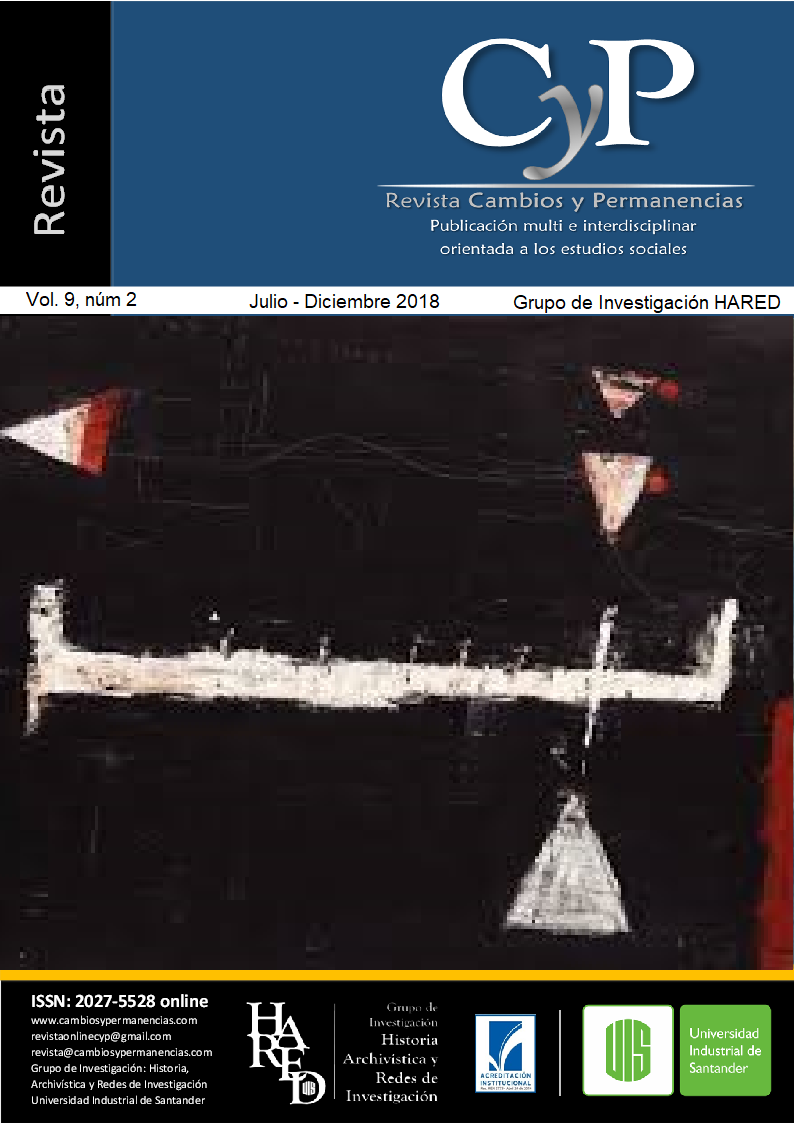Socio-political imaginaries and Postcolonial Studies. Presuppositions and implications of relativist conceptions at the present time
Published 2018-12-20
Keywords
- democracy,
- human rights,
- Islam,
- postcolonial studies,
- relativism
How to Cite
Abstract
In order to analyze the collective imaginaries which build the basis of most of the actual social sciences, it seems necessary to put into question the theoretical frames of the postcolonial studies and akin approaches. Edward W. Said and the postcolonial studies analyze the complex links between academic activities and political power: scientific and literary knowledge about foreign cultures could have prepared the occupation and the conquest of them by the European states. But the postcolonial studies also embrace unbearable generalizations and evident contradictions about the proper history of the Third World. They overlook the authoritarian aspects of the political and cultural traditions of African, Asian and Latin American countries.
Downloads
References
2. Arendt, H. (2010). Was ist Politik? (¿Qué es política?), edición crítica de Ursula Ludz, Munich: Piper.
3. Arendt, H. (2013): “Fernsehgespräch mit Günter Gaus” (Entrevista televisiva con Günter Gaus), en: Hannah Arendt, Ich will verstehen. Selbstauskünfte zu Leben und Werk (Quiero comprender. Informaciones de la propia autora sobre la vida y la obra), compilación de Ursula Ludz, Munich: Piper, 46-72.
4. Aristóteles (1966). Metaphysik (Metafísica). Reinbek: Rowohlt.
5. Arkoun, M. (1994): Rethinking Islam: Common Questions, Uncommon Answers Today, Boulder: Westview.
6. Bassiouni, M. (2014). Menschenrechte zwischen Universalität und islamischer Legitimität (Los derechos humanos entre la universalidad y la legitimidad islámica), Berlín: Suhrkamp.
7. Bayart, J-F. (2010). Les études postcoloniales, un carnaval académique, París: Karthala.
8. Castro Varela, M. do M. y Dhawan, N. (2005): Postkoloniale Theorie. Eine kritische Einführung (La teoría postcolonial. Una introducción crítica), Bielefeld: transcript.
9. Castro-Gómez, S. y Grosfoguel, R. (comps.) (2007). El giro decolonial: reflexiones para una diversidad epistémica más allá del capitalismo global, Bogotá: Siglo del Hombre Editores.
10. Chakravarty, D. (2000). Provincializing Europe: Postcolonial Thought and Historical Difference, Princeton: Princeton U. P.
11. Cocarico Lucas, E. (2006). El etnocentrismo político-jurídico y el Estado multinacional: nuevos desafíos para la democracia en Bolivia. América Latina Hoy. Revista de Ciencias Sociales (Salamanca), (43), 131-152.
12. Costa, S. (2003). Derechos humanos en el mundo poscolonial. Nueva Sociedad (Buenos Aires), noviembre-diciembre, 52-65.
13. Dirlik, A. (1997). The Postcolonial Aura: Third World Criticism in the Age of Global Capitalism, Boulder: Westview Press.
14. Fest, J. (2007). Bürgerlichkeit als Lebensform. Späte Essays (Civilidad como forma de vida. Ensayos tardíos), Reinbek: Rowohlt.
15. Habermas, J. (1966). Nachwort (Epílogo). En G. W. F. Hegel, Politische Schriften (Escritos políticos), (343-370). Frankfurt: Suhrkamp.
16. Habermas, J. (2009). “Anerkennungskämpfe im demokratischen Rechtsstaat” (Luchas por el reconocimiento en el Estado democrático de derecho). En Charles Taylor et al., Multikulturalismus und die Politik der Anerkennung (Multiculturalismo y la política del reconocimiento) (53-62). Frankfurt: Suhrkamp.
17. Habermas, J. (2013). ¿Democracia o capitalismo? Nueva Sociedad (Buenos Aires), (246), julio-agosto, 32-46.
18. Kerner, I. (2012). Postkoloniale Theorien zur Einführung (Introducción a las teorías postcoloniales). Hamburgo: Junius.
19. Küng, H. (2006). Der Islam. Geschichte, Gegenwart, Zukunft (El Islam. Historia, presente, futuro), Munich / Zurich: Piper.
20. Laroui, A. (1979). L'idéologie arabe contemporaine, París: Maspéro.
21. MacKenzie, J. (1995). Orientalism. History, Theory and the Arts, Manchester: Manchester U. P. Madrid: Alianza.
22. Mair, P. (2015). Gobernando el vacío. La banalización de la democracia occidental,
23. Marchart, O. (2010). Die politische Differenz. Zum Denken des Politischen bei Nancy, Lefort, Badiou, Laclau und Agamben (La diferencia política. Sobre el pensamiento de lo político en Nancy, Lefort, Badiou, Laclau y Agamben), Berlin: Suhrkamp.
24. Marchart, O. (2013). Das unmögliche Objekt. Eine postfundamentalistische Theorie der Gesellschaft (El objeto imposible. Una teoría postfundamentalista de la sociedad), Berlin: Suhrkamp.
25. Mehring, R. (2003). Das "Problem der Humanität". Thomas Manns politische Philosophie (El “problema de la humanidad”. La filosofía política de Thomas Mann), Paderborn: Mentis.
26. Moore-Gilbert, B. (1998). Postcolonial Theory. Contexts, Practices, Politics, Londres / New York: Verso.
27. Nerval, G. de (1956). “Voyage en Orient”. En Gérard de Nerval, Oeuvres, texto establecido y anotado por Albert Béguin y Jean Richer (II, 94-313). París: Bibliothèque de la Pléiade / Gallimard.
28. Parry, B. (2004). Postcolonial Studies. A Materialist Critique, Londres / New York: Routledge.
29. Said, E. W. (1978). Orientalism, New York: Vintage.
30. Said, E. W. (1981). Orientalismus (Orientalismo). Frankfurt: Ullstein.
31. Said, E. W. (1983). The World, the Text and the Critic. Cambridge: Harvard U. P.
32. Said, E. W. (1993). Culture and Imperialism. Londres: Chatto & Windus.
33. Sandoval, P. (comp.), (2009). Repensando la subalternidad. Miradas críticas desde / sobre América Latina. Lima: IEP.
34. Spivak, G. C. (2010). Crítica de la razón poscolonial. Madrid: Akal.
35. Taylor, Ch. (2002). Die Formen des Religiösen in der Gegenwart (Las formas de lo religioso en el presente). Frankfurt: Suhrkamp.
36. Taylor, Ch. (2009). “Die Politik der Anerkennung“(La política del reconocimiento). En Charles Taylor et al., Multikulturalismus und die Politik der Anerkennung (Multiculturalismo y la política del reconocimiento) (11-66). Frankfurt: Suhrkamp.
37. Tibi, B. (1981). Die Krise des modernen Islams. Eine vorindustrielle Kultur im wissenschaftlich-technischen Zeitalter (La crisis del Islam moderno. Una cultura pre-industrial en la era científico-técnica). Munich: Beck.

